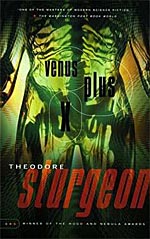
![]() Emil
Emil
7/11/2012
![]()
Ideologies don't make good plots, and Venus Plus X suffers from this, despite the interesting sexual commentary in the wake of feminism, gay liberation and the sexual emancipation of the 1960s. I've read that Sturgeon laboured intensely over this novel and anatomized its philosophies from William James, Erich Fromm and Margaret Read, and was more than a little hurt and overwrought by its lack of appeal.
It is an unsuccessful utopian novel, and I can only think that its zeal at the time earned it its place in Pringle's list of 100 best SF novels - in 1960 it was obviously way ahead of its time, and its critique of human prudence is still very prescient; in addition the book may still hold an abiding allure to those who have affirmed humanity's entrance into the Aeon of the Crowned and Conquering Child, as postulated by Aleister Crowley. But as expression of Sturgeon's literary prowess the novel is sadly lacking. Many of Sturgeon's other work are better examples of his gifts. More Than Human is persuasively brilliant, To Marry Medusa certainly more than worthwhile and his short stories "If All Men Were Brothers, Would You Let One Marry Your Sister?" (in Dangerous Visions), "Killdozer," "Slow Sculpture" and "The Man Who Learned Loving" are all legendary. Against these Venus Plus X has evidently lost most of its original power.
The plot is something like this: 27-year old Charlie Johns wakes up in a totally different society, first appearing to be an Earth of the future, to later discover that he has been snatched by alien humanoids to tour and form an opinion of their world, Ledom, and to learn everything about it and to "judge" Ledom by his standards before he is returned. Shockingly, he discovers early on that the human race has evolved to the point where everybody is a hermaphrodite. Sturgeon has created an utopia without flaws, without conflict, sexual competition, or gender. Charlie learns that Earth's problems have a lot to do with power, shame and sex, ultimately leading to Mars and Venus declaring Word War 3. Charlie is led to believe that Ledom's society is Earth's future, but something is not quite right. Some compelling questions remain, none more so than those about the origins of humanity's bigendered evolution.
Running concurrently with the main narrative, Sturgeon intersperse vignettes from the life of an ordinary middle class family, illuminating relevant issues addressed by Charlie's adventures in the strange, exotic utopian world of Ledom. These vignettes highlight different gender roles and stereotypes and did still invoke in my mind some interesting questions about gender identity.
Charlie would ultimately pronounce harsh judgement, stemming from his disgust of what humankind has become:
"Why is what you do evil? Men marrying men. Incest, perversion, there isn't anything rotten you don't do."
The book isn't about homosexuality; although, it is certainly a timely read considering the political contentions about gay marriages.
Despite the first quarter of the book doing a beautiful job with expressing the wonderful bewildering sense of true alieness (as good to great SF novels should do), which recalled my experience with the enigmatic Solaris, it tumbled from there into extensive descriptions, lean plotting and clunky sermons. I appreciate Sturgeon's effort, but wanted Venus Plus X to be a lot more. Can it really be this simple: that humanity can't accept utopia without giving up sexual taboos?
(Mhmm, I did not like the book much, but still managed to write an essay. I guess there is something there, but as yet can't really put my finger on it.)